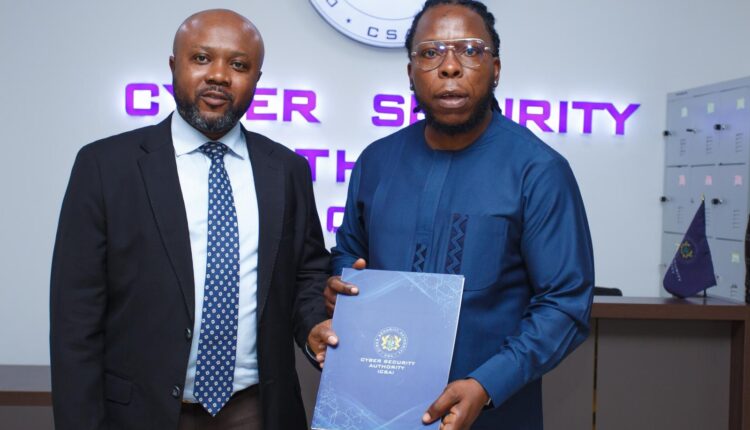The Safer Digital Ghana Campaign 2025 is strategically meant to span across all 16 regions of Ghana, using multiple languages and formats to reach Ghanaians from all walks of life expected to foster a culture of cyber hygiene, through widespread awareness and education, the Acting Director-General of the Cyber Security Authority (CSA), Mr. Divine Selase Agbeti has said.
In addition, he stated that, the initiative has its particular focus or target on; Children, the Public, Businesses, and Government for resilience and digital responsibility.
He made this known when CSA on Wednesday, July 16, unveiled Ghanaian rapper, Ayigbe Edem known in real life as Denning Edem Hotor, as an ambassador for the programme at the agency’s office in Airport City, Accra.
“Implemented by the Cyber Security Authority, with support from the Ministry of Communication, Digital Technology and Innovations under the Ghana Digital Acceleration Project, this campaign is a strategic national response expected to foster a culture of cyber hygiene, resilience and digital responsibility through widespread awareness and education.
“The nationwide campaign will span all 16 regions of our country, using multiple languages and formats to reach Ghanaians from all walks of life with particular focus on four main pillars or target audience; that is, Children, the Public, Businesses, and Government. It will equip children and the public with safe internet practices, online privacy, and digital citizenship, guide businesses to secure their infrastructure and data, and support government institutions to strengthen their cybersecurity frameworks” he revealed.
He further stated, “Through radio, television, newspapers, billboards, digital platforms, and community engagements, the Safer Digital Ghana Campaign will demystify cyber threats and empower Ghanaians to take proactive safety measures. In the coming months, we anticipate tangible outcome in the form of increased reporting of cyber incidents, greater public trust in digital services, safer online experiences for children, and a stronger national awareness of digital risks and responsibilities.
Concluding his speech, he explained, “cybersecurity is not just the responsibility of governments or technology experts; it is everybody’s responsibility. Every child with a smartphone, every entrepreneur managing an online business, and every public servant using digital systems must be equipped with the knowledge to navigate cyberspace safely. Government remains an enabler for cybersecurity development and is commitment to working with key stakeholders to create the needed awareness and structures for the development of cybersecurity in the country.”
Edem, on his part, as a brand ambassador, indicated that, he has dedicated himself to the success of the programme.
“This initiative goes beyond raising awareness it seeks to empower every Ghanaian, from school children to business leaders, government workers to everyday citizens, to take active steps in safeguarding themselves, their families and their communities online.
He added, “As Brand Ambassador, my role is not merely to serve as the public face of this campaign, but to be a dedicated advocate for change. I am committed to using my platform to promote cyber hygiene, encourage the reporting of cyber incidents and champion safe internet practices, particularly among young people.
“Our shared mission is clear: to ensure that every Ghanaian recognises that cybersecurity is not just a technical concern, it is a personal duty, a societal obligation and a national priority. Together, we can build a more secure, resilient and digitally empowered Ghana. Thank you for this opportunity. I am truly honoured to serve.”
The nationwide initiative aims to promote online safety and cybersecurity awareness among Ghanaians.
The campaign seeks to educate citizens on the importance of cybersecurity and provide them with the necessary skills to protect themselves from cyber threats. It is expected to reach various campuses, including Senior High Schools.
It also aims to promote cybersecurity best practices across all age groups and combat cybercrime and digital threats, including phishing, scams, misinformation, online blackmail, and data breaches.
Additionally, the campaign is designed to enhance digital resilience among individuals, schools, communities, and institutions, and to raise awareness of the Cybersecurity Act, 2020 (Act 1038).
The Safer Digital Ghana Campaign will focus on several key areas, including:
- Educating citizens on the risks associated with online activities and providing tips on how to stay safe online.
- Equipping citizens with the necessary skills to effectively use digital technologies and protect themselves from cyber threats.
- Encouraging the reporting of cybercrime incidents and providing citizens with the resources to do so.
The focus of the campaign is on four target groups, with appropriate topics tailored for each:
Children’s Campaign: Topics include Cyberbullying, Digital Footprint, Password Hygiene, and Parental Control.
General Public: Topics cover Online Scams, Social Engineering, Phishing, Account Takeovers, and Fake News.
Businesses: Focus areas include Supply Chain Risks, Email Compromise, and Backup and Recovery Plans.
Government Agencies: Key topics include Insider Threats, Threat Intelligence Sharing, and Incident Reporting.


Comments are closed.